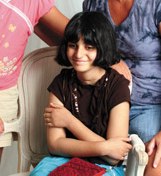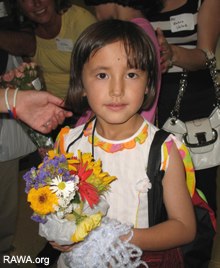LNCR/RAWA Project for the Treatment of Sick Afghan Children in the USA
Host families welcome sick Afghan children into their hearts
By Amy Fuhrman

Sarinah during a photo session at Deborah Young Studio in Cornelius.
Sarinah sits quietly in a chair, nervously playing with the sequins on her borrowed brown shirt. A turquoise skirt tops her slightly-too-big blue jeans and she clutches a small purse.
Around the room, conversation swirls around her in a blur of strange voices and sounds. Every now and then, when the group of voices erupts in laughter, the 11-year-old gives a shy smile and giggles a little.
What she is thinking is anyone's guess, but at the moment the small blind girl from Afghanistan who speaks no English seems content waiting to have her picture taken at Deborah Young Studio in Cornelius.
But Sarinah is also waiting for much more than that. She - and six other children from Afghanistan - have traveled to Lake Norman in search of what some would call a miracle.
Children in need
The Lake Norman Children's Relief has been bringing sick, needy children from Belarus to LKN for the past 11 years. The goal is to provide them with medical and dental care - and love, says the group's president and co-founder, Dick Wilson of Mooresville.
This year, however, the group expanded its efforts, also bringing seven children from Afghanistan to stay with local families.
Local churches cover the travel costs, and all the childrens' medical care is free, provided by generous doctors who volunteer their time and talents.
Host families are recruited through local churches - Sarinah's host family, the Watts, attend Davidson United Methodist - and agree to care for the children for a six-week period, taking them to all their medical appointments and involving them in the family life.
"It's sort of like being born again for most of these families," Wilson said. "It's just an experience that would be difficult to explain unless you've been through it."
'In the shadow of guns'

RAWA: Group photo of the 7 sick children with their translator before leaving towards the USA. The children were selected by RAWA from different parts of Afghanistan from among the neediest families of different ethnic groups.
Sitting folded in a comfy armchair in the home of her Mooresville host family, 18-year-old Orbal flips through a little, brightly colored diary. It looks like the kind of notebook a girl would keep her friends' phone numbers in.
But Orbal, the interpreter for the Afghan children and a member of RAWA (Revolutionary Association of the Women of Afghanistan), keeps a very different set of numbers and names on the book's pages.
More than 700 children in Afghanistan die every day from violence, poverty, a lack of water and poor health care. More than 50 women die each day, she says, a fire burning in her eyes.
Orbal is here to help the children navigate life in a strange country. But she is also here on a mission. She wants the world to know what is happening in Afghanistan, and she wants them to know who she - and the members of RAWA - believe are responsible.
Carefully written in the notebook are names of people RAWA believes should be brought to justice by an international court: Sayyaf, Rabbani, Qanooni, Fahim, Khalili, Faroqi ... the list goes on. She reads each name and slowly spells them, making sure they are written down correctly.
It is the people in power in Afghanistan, and those who support them, who are keeping conditions almost unlivable for its people, she said.
The fight for a better life for women and children is in Orbal's blood. Her mother is a member of RAWA and Orbal has been learning the group's mission - and their willingness to die for it - since birth.
"Every sight of people suffering, of innocent civilians dying, it makes your passion much stronger," she said.
Coverage on www.wbtv.com
When asked what life is like for the children in Afghanistan, especially those in rural provinces, she describes the brutal rape of young girls, one of whom was kidnapped, raped and then traded for a dog. Young children are forced to work to help their families, begging naked in the street. Women are treated like property.
"They don't think of a woman to be a human being, a living creature," she says.
The perpetrators of violence are rarely punished, with those in power looking the other way, or sometimes even being guilty of it themselves, Orbal says. Few speak out, for fear of reprisal.
"They live in the shadow of threats, the shadow of guns," she said.
A world gone dark
Sarinah should probably never have lost her sight.
Her illness, a high fever and suspected meningitis, could likely have been treated and her vision saved had she had access to good medical care, Orbal said.
Instead, she wound up in a coma for nine months. When she awoke, the bright, normal life she had known had gone dark, said Kathy Watts, Sarinah's host mother.
Though her family struggles financially, Sarinah describes a loving home, where she is doted on a bit because of her handicap. Some of the children brought to LKN by Lake Norman Children's Relief come from orphanages, others from homes with many extended family members living under one roof.
Still, her brief stay in the United States has been a transition for both her and her host family, says Kathy, who put a baby monitor in Sarinah's room so she can hear if the girl needs her in the night.
Translators like Orbal and one of Kathy's friends, who speaks Farsi, help out, but otherwise the Watts family is on its own, trying to communicate with Sarinah without a shared language or her sight.

7-years old Asma is being welcomed in the airport in NC-USA by her host family. She had a serious medical problem but her poor family could not afford to do her treatment.
"This is all we have to communicate with her," says Suzy Watts, 9, waving a sheaf of neon green pages containing basic translations.
They've learned a few simple words, like how to ask her if she's thirsty. At the photo session - Cornelius photographer Deborah Young has been taking each LNCR child's picture for years - Sarinah quietly shakes her head when asked if she'd like a drink.
Figuring out what she likes to eat has also been diffiucult. That morning, through trial and error, Kathy said they discovered she likes pineapple.
Despite some of the challenges, Sarinah says she's happy here so far. And they're finding ways to enjoy time together, like listening to High School Musical, which Kathy says had Sarinah laughing during the songs.
Still, Kathy knows that Sarinah is hoping the doctors will be able to repair her eyesight, and prays the little girl won't be let down.
"If they can't ..." she says, wondering how she'll convey the news to Sarinah.
Host families often find themselves deeply affected by what the children in their care are going through, said Wilson, the group's founder.
He should know. He's been down that same road many times, taking in the first children one summer 11 years ago.
"You fall in love with these children," he said. "They're just like your own."
Source: http://www.statesville.com
[Home] [RAWA in the Media] [Books on RAWA] [RAWA Orphanages]